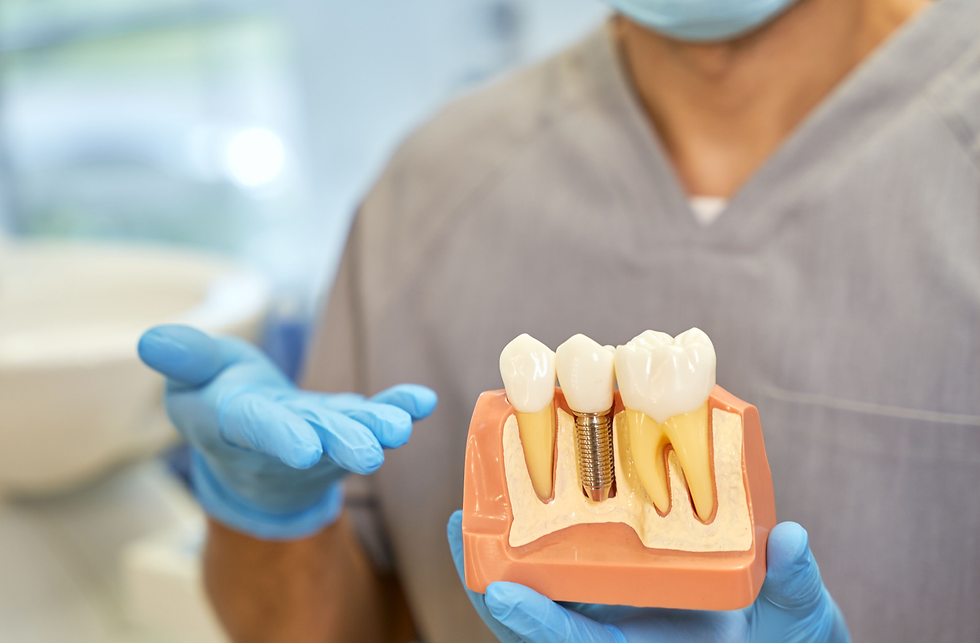How Dental Crowns Can Restore Your Tooth’s Function and Appearance in Dubai
- Areej george
- Aug 21, 2024
- 4 min read
Dental crowns are a versatile and effective solution for restoring both the function and appearance of damaged or decayed teeth. Whether you're dealing with a severely worn-down tooth, a cracked tooth, or a tooth with a large filling, dental crowns can provide a lasting solution. In Dubai, where advanced dental care is widely available, crowns offer patients a chance to regain their confidence and oral health.
Understanding Dental Crowns
Dental Crowns and Bridges Dubai, also known as caps, are prosthetic devices that cover the entire visible portion of a tooth. They are designed to encase a tooth that has been compromised, providing strength, protection, and a natural appearance. Crowns can be made from various materials, including metal, porcelain, ceramic, and resin, each offering different benefits based on the specific needs of the patient.

The Benefits of Dental Crowns
Restoring Tooth Function
One of the primary functions of a dental crown is to restore a tooth’s functionality. When a tooth is severely damaged or decayed, it may lose its ability to chew properly. Crowns help in:
Reinforcing Strength:
Crowns provide a robust cover that reinforces the tooth’s strength, allowing it to withstand the pressures of chewing and biting.
Preventing Further Damage:
By covering and protecting the damaged tooth, crowns prevent further deterioration and potential breakage.
Improving Bite Alignment:
Crowns help to correct bite issues caused by damaged or misaligned teeth, leading to a more comfortable and effective chewing experience.
Enhancing Aesthetic Appeal
Beyond functionality, dental crowns are also crucial for improving the aesthetic appearance of a tooth. They are particularly beneficial for:
Restoring Natural Look:
Crowns can be customized to match the color and shape of your natural teeth, making them virtually indistinguishable from the rest of your smile.
Repairing Cosmetic Issues:
Crowns can cover discolored, misshapen, or uneven teeth, enhancing overall smile aesthetics.
Boosting Self-Confidence:
With improved appearance and functionality, patients often experience a boost in self-esteem and confidence.
The Dental Crown Procedure
Initial Consultation and Assessment
The process of getting a dental crown begins with a thorough consultation and assessment by a dental professional. This includes:
Evaluating Tooth Health:
The dentist examines the damaged tooth and surrounding area to determine the appropriate treatment.
Discussing Options:
Different types of crowns and materials are discussed, allowing the patient to make an informed decision based on their needs and preferences.
Tooth Preparation
Once the type of crown is chosen, the dentist prepares the tooth for the crown:
Cleaning and Shaping:
The tooth is cleaned and shaped to ensure a proper fit for the crown. This may involve removing decayed or damaged portions.
Taking Impressions:
Impressions of the prepared tooth are taken to create a mold for the custom crown. This ensures that the crown fits perfectly and aligns with your bite.
Crown Placement
The final step involves placing the dental crown:
Temporary Crown:
While waiting for the permanent crown, a temporary crown is placed to protect the prepared tooth.
Fitting and Cementing:
Once the permanent crown is ready, the dentist checks the fit and makes any necessary adjustments. The crown is then cemented into place, restoring the tooth’s function and appearance.
Types of Dental Crowns
Metal Crowns
Metal crowns, often made from alloys or gold, are highly durable and resistant to wear. They are ideal for molars or back teeth where strength is crucial. Metal crowns are less noticeable but offer superior protection and longevity.
Porcelain Crowns
Porcelain crowns are popular for their natural appearance. They blend seamlessly with surrounding teeth and are ideal for visible areas. They are less durable than metal crowns but provide an excellent aesthetic solution.
Ceramic Crowns
Ceramic crowns are similar to porcelain crowns but offer a more natural appearance and are less prone to chipping. They are a good choice for patients with metal allergies or those seeking a more aesthetically pleasing option.
Resin Crowns
Resin crowns are more affordable and can be used as a temporary solution. They are less durable and prone to wear over time but can be an effective option for short-term needs.
Caring for Dental Crowns
Proper care is essential to ensure the longevity and effectiveness of dental crowns:
Oral Hygiene:
Maintaining good oral hygiene by brushing and flossing regularly helps prevent decay and damage to the crowned tooth.
Avoiding Hard Foods:
To prolong the life of the crown, avoid chewing hard foods or using teeth as tools.
Regular Check-ups:
Regular dental check-ups ensure that the crown remains in good condition and allows for timely adjustments if needed.
Conclusion
Dental crowns are a valuable tool in modern dentistry, offering a solution to restore both the function and appearance of damaged teeth. In Dubai, patients can benefit from advanced dental technologies and expert care to ensure optimal results. By understanding the benefits, procedures, and care associated with dental crowns, you can make informed decisions and enjoy a healthy, confident smile for years to come.












Comments